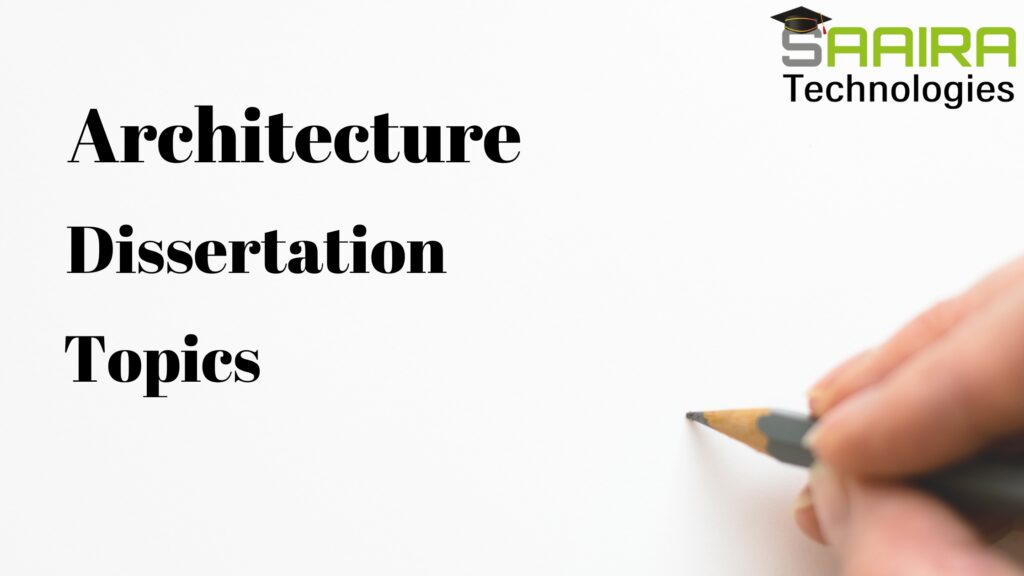Architecture Dissertation Topics: A Complete Reference Guide

Identifying a dissertation topic in architecture is a challenge that may overwhelm students. The idea should be creative, relevant and MBA researchable with an added value to the existing literature. In this guide, the reader will find answers to questions such as: Discuss compelling topics in relation to architectural research, how to choose a perfect dissertation topic, and what trends can be mentioned today.
Evaluating the Significance of a Proper Dissertation Topic
Choosing a proper dissertation topic is always a question of interest, as well as the current existing research gaps. Work should be possible to accomplish within the set timeframe and available resources and should point to further research possibilities.
Most popular dissertation topics in the field of architectural science
Sustainable Architecture
Sustainable architecture deals with the designing of buildings in a way that they are energy efficient, and can also incorporate the utilization of sustainable materials and construction methods.
Key Areas to Explore:
- Passive solar design
- Green roofs and walls are gaining popularity due to their numerous benefits such as water management and energy conservation.
- Energy-efficient building systems
- Recycling and using local materials
Urban Regeneration
Urban regeneration is an urban management strategy for renewing deteriorated urban areas in order to enhance the economic, social, and environmental quality.
Potential Research Topics:
- The following are the views of some selected local communities on the impact of urban regeneration.
- Various approaches in designing the urban renewal
- Case study of successful postindustrial urban regeneration programmes
Smart Cities
Smart cities use ICT to enable effective usage of resources and enhance the welfare of citizens residing in city regions.
Research Opportunities:
- Role of IoT in construction of smart cities
- Smart transportation systems
- Social, economic and environmental impacts of smart technologies for sustainable urban planning
Heritage Conservation
Heritage preservation is the process of maintaining parks, structures, and other spaces that have historical, cultural or architectural value.
Suggested Topics:
- Efforts towards conservation of historical buildings
- socio-economic development as well as addressing today’s changing requirements and demands and integrating it with the need to preserve the historic old town area.
- Sources of funding in the conservation of heritage in Tunisia
Adaptive Reuse
He noted that adaptive reuse means recycling with transformation of old buildings for new and different uses, but with retention of the historical fabric.
Possible research areas:
- Over and above, the over capitalization of the building has several economic benefits, such as adaptive reuse.
- Problems in adaptive reuse development
- SRI database: case studies of successful adaptive reuse
Now that you have chosen to do a dissertation, the next question is how you settle on the right topic.
Align with Your Interests
Avoid topics that are boring or mundane; make sure you choose a topic that you will be happy to discuss. Your passion for matters concerning the subject is the key force and strength in keeping up the research endeavour.
Conduct Preliminary Research
In order to avoid this, one should do a quick research before choosing the final topic, in order to see if there is enough material on this topic, and whether the topic is too general or too specific.
Seek Advice from Advisors
When in doubt, you should always seek advice from your academic advisors or mentors. They can help record their ideas and assist in narrowing down a subject.
Consider the Feasibility
Assess the applicability of your topic in light of certain criteria, such as, available references and resources, the time frame of the project, and the availability of relevant data.
For instance, the structure of a dissertation might be as follows:
To assist you in organizing your dissertation, here is an example structure:To assist you in organizing your dissertation, here is an example structure:
Introduction
- Minimally invasive surgery to treat gastric cancer: background and context of the research
- The pan African research problem of study and research objectives
- It is crucial to understand that this research work will make significant contribution to the existing literature by filling the gap that exist in the literature review section of this research work.
Literature Review
There has been some preliminary research conducted on the efficiency of generation of contract knowledge through collaboration between knowledge workers This study forms the foundation of the current research The conclusion drawn in the said study is that deterministic factors of communication, technology and task characteristics, complemented by the application of social network theory, increase the efficiency of generation of contract knowledge Between knowledge workers Several studies have been conducted in the past on the impact of deterministic factors such as communication, technology, and task characteristics
Based on the findings of this study, various research gaps have been identified as follows:
- Theoretical framework
Methodology
- Research design
- Data collection methods
- Data analysis techniques
Results
- Presentation of findings
- Interpretation of results
Discussion
Based on the above findings, the following day, the SABC News, Newzroom Afrika, and African
The News Agency will publish the summary of the study and its ramifications as follows:
- The study can be further advanced by comparing the results obtained with existing literature in the field.
- Thus, the following are limitations to the study
Conclusion
The following constitutes the findings of the study based on the hypothesised relationships:
Based on the above observations, the following recommendations for future research may be useful:
Choosing the appropriate topic for a dissertation in architecture is perhaps one of the most important strategies necessary in any person’s academic experience. Realism makes use of the present tendencies to steer clear of an irrelevant subject and draws interest to a feasible curriculum. Follow the guidance provided herein as a foundation, but do not hesitate to discuss with your supervisors to perfect your conceptions and start an enriching research process.
